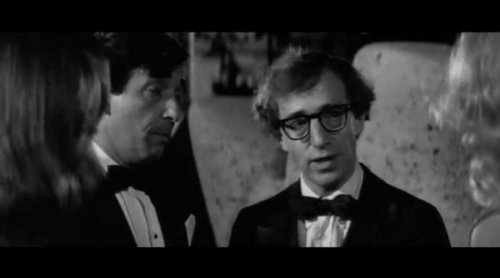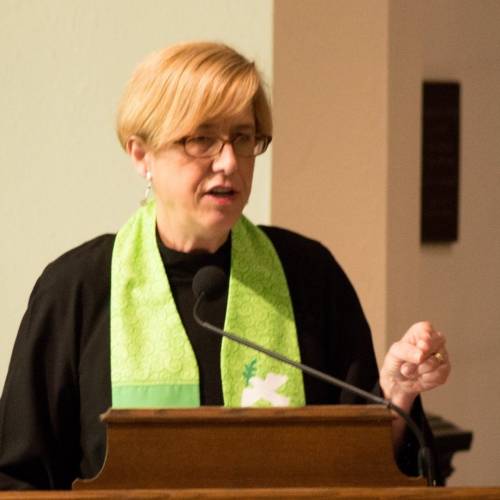The Whole World is Watching
Where should Christians stand in the face of evil?
by Susan Rothenberg
Lately, I’ve been thinking about a quote from the Woody Allen movie, “Manhattan.”
 “Has anybody read that Nazis are gonna march in New Jersey? Y’know, I read this in the newspaper. We should go down there, get some guys together, y’know, get some bricks and baseball bats and really explain things to them.”
“Has anybody read that Nazis are gonna march in New Jersey? Y’know, I read this in the newspaper. We should go down there, get some guys together, y’know, get some bricks and baseball bats and really explain things to them.”
“There is this devastating satirical piece on that on the Op Ed page of the Times, it is devastating.”
“Well, a satirical piece in the Times is one thing, but bricks and baseball bats really get right to the point.”
I was on a road trip with my son when Charlottesville happened. Out in the middle of nowhere, with lousy cell service, no satellite radio, and mostly Christian and country music radio stations in our rental car, I was able to receive only snippets of information about what happened when white supremacists, some of them carrying Nazi flags and torches, shouting, “Jews will not replace us,” came to town to protest the removal of a Confederate statue. When we got to our hotel room in Rapid City, South Dakota, I finally saw the images on television and was appalled.
The next day, while I was blithely meandering in Badlands National Park, many of my Presbyterian and other mainline clergy colleagues showed up in Charlottesville to take a peaceful and principled stand against those despicable protestors. In many written accounts, some clergy credited the Antifa for protecting them from white supremacists who may have injured those peaceful pastors as tempers flared. The fact that Heather Heyer was killed when a car crashed into demonstrators proves that lethal violence was not a remote possibility, but a too-real reality in Charlottesville on August 12.
Some of my friends and colleagues have pointed out the privilege of (mostly) white clergy who stood on the side of non-violent resistance, but were protected by those who were willing to put their bodies between them and the white supremacists carrying torches and guns and using cars as weapons.
Where should my body be if I am serious about standing against the kind of hatred so vividly demonstrated in Charlottesville?
Although my children are baptized Christians who were raised in the Presbyterian Church, my husband and their father is Jewish. The sight of a flag with a swastika makes the blood in my veins run cold. There is no question I would immediately put my body between my children’s bodies and a Nazi, even a Nazi with a gun or a baseball bat. I wouldn’t think twice.
But where should my body be when the stakes are not so personal? Where do I stand if I am serious about following the way of Jesus? Do a hide behind a devastating satirical piece (or, in my church-y world, a well-crafted sermon)? Or do I pick up a brick or a baseball bat?
These are hard questions. And they are urgent questions.
I am no anarchist, not by the longest shot. I am a pacifist by nature who believes violence begets only more violence. My understanding of who Jesus is has been largely shaped by his call to forgive the enemy. The events of the past few weeks, however, have challenged me to honestly confront my own privileged position which keeps me protected from weapons of hate brandished by white supremacists. I can choose to have someone else put their body on the line on my behalf. Those who do not have my privilege have no choice at all but to fight back because they have very good reason to believe they cannot depend upon police officers to protect them.
In my city this week, on the anniversary of The March on Washington, MLK’s “I Have a Dream Speech,” and the lynching of Emmett Till, clergy marched for racial justice and made public statements. Clergy marched in other cities around the nation, including Washington, D.C. I was not able to attend the march here in Pittsburgh due to a commitment I made long ago.
What struck me was that Pittsburgh area clergy gathered in a neighborhood, not far from my home, that is one of the most liberal and multi-ethnic in the region. It is the last place you’d expect to find a Nazi or any white supremacist. My neighborhood is the ultimate “safe space,” and the clergy who marched were, in a very real sense, “preaching to the choir.” I do not mean to criticize the organizers, but the march made me wonder if Christians would be more effective in our witness if we were willing to put our bodies in places that are not always so safe. Just as the civil rights workers in the ’60s travelled to openly hostile territory to register African-American voters, so too must we (must we?) be willing to proclaim the truth of the Gospel in hostile spaces.
That place may look different depending on your context and culture. For many of my clergy colleagues, stepping into the pulpit and preaching the Gospel in this time feels like a high wire act. For some of us, these days may indeed call us out to risk our bodies and even be willing to lose our lives for the sake of the Gospel in ways that are not even remotely metaphorical.
I have no answers today, but I do know one truth for certain. God is waiting to see if we mean it when we call ourselves followers of the crucified Christ. The stakes are high. And the whole world is watching to see where we stand.
Susan Rothenberg is  a leader in the Unglued Church Project and an at-large member of Pittsburgh Presbytery. Formerly, she has served as pastor to a small church in Pittsburgh, and currently co-moderates the presbytery’s Commission on Ministry and serves on the Anti-Racism Transformation Team. Prior to entering ordained ministry, she worked in marketing, advertising and public relations. She has one husband, two children, and two crazy cats. The opinions she expresses are entirely her own, so if you disagree with her, do not blame Pittsburgh Presbytery.
a leader in the Unglued Church Project and an at-large member of Pittsburgh Presbytery. Formerly, she has served as pastor to a small church in Pittsburgh, and currently co-moderates the presbytery’s Commission on Ministry and serves on the Anti-Racism Transformation Team. Prior to entering ordained ministry, she worked in marketing, advertising and public relations. She has one husband, two children, and two crazy cats. The opinions she expresses are entirely her own, so if you disagree with her, do not blame Pittsburgh Presbytery.